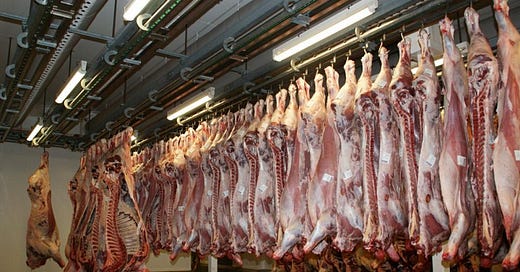TL;DR (too long, didn’t read) version:
An investigation by Farmers Weekly has exposed a UK food manufacturer selling foreign pork and falsely labeling it as British. The company is also accused of mixing rotten meat with fresh meat for processing, and falsifying paperwork.
The UK Food Safety Agency is carrying out a criminal investigation and Farmers Weekly is recommending digital record-keeping, action to address shortfalls in audit procedures and the establishment of whistleblowing lines.
As a consumer, be skeptical about certification labels, be conscious about the level of processing in the food you buy, and consider buying from a local butcher.
This one got a bit of traction in the media last week, but I suspect once the company’s name becomes public (it’s currently undisclosed due to legal reasons), it could be big news in the UK. Horsemeat scandal kind of big.
An investigation by Farmers Weekly has exposed a food manufacturer selling foreign pork and calling it British. It’s also been accused of “washing” rotten meat, or mixing it with fresh for further processing. Other products weren’t kept at the right temperature, with meat thawing on the factory floor. Falsification of paperwork has also been alleged.
Processed meat from this supplier has ended up in ready meals, quiches, sandwiches and other stuff in major supermarkets here in Blighty. Other food service companies may have also been supplied indirectly, as well as prisons and care homes.
These establishments were unaware of all of this because auditors were being deceived. “Surprise” audits on the site didn’t work, because 15 minutes is allowed before the auditors can actually begin: enough time to hide any wrongdoing and roll out the silverware. During these audits, some have claimed that managers would be moving dodgy meat around, keeping it constantly out of sight as the inspectors toured the place.
The supplier was systematically carrying out country-of-origin fraud by buying some British meat, then using that delivery’s traceability information for all its products that week. This allowed the company to buy cheap foreign pork, and sell it at a higher price with a UK label.
Employees knew about the criminality, with some of them blowing the whistle, leading to this investigation. But if anyone spoke out onsite at the time, they were threatened with the sack, given the worst tasks, or simply bullied until they left the company. Some whistleblowers have claimed that this kind of behaviour isn’t just limited to the company under investigation.
The UK Food Safety Agency (FSA) is now carrying out a criminal investigation and advised retailers last year to “check their cooked meat supply chain and to apply extra due diligence in their checks”. Retailers and other businesses affected by this are up in arms about it, and industry leaders are seeing this as a wake-up call. The role of the FSA as the regulator has come into focus. One source claimed to have alerted them several years before it officially started investigating in 2020.
📋 The folks at Farmers Weekly have made the following recommendations to try to avoid future criminality. It seems like basic common sense to me, so let’s hope this stuff gets implemented:
Make digital record-keeping mandatory. Paper records are no good because they can be destroyed.
Address the 15-minute gap between auditors signing into a premises and entering the factory floor, to avoid companies brushing things under the carpet.
Establish a whistleblowing line and require it be displayed in factories in multiple languages.
Ensure an independent body is insisting on total mass balance reports to enhance traceability. The manufacturer under investigation here got away with it because the supplier’s customers operated independently, only auditing their own supply chains. A mechanism to aggregate data across different companies would help to highlight discrepancies in the supply chain.
🧐 That’s all very well, but how can we as consumers get confident that what we’re eating a) is what it claims to be and b) isn’t rotten?
Be skeptical. Don’t just rely on labels. Every retailer affected by this talked about their adherence to BRCGS [Brand Reputation Compliance Global Standards] or GFSI [Global Food Safety Initiative] standard, but those obviously haven’t helped here.
Be conscious about the level of processing in the products you buy. A ready meal lasagne will be much harder to break down and understand than a homemade lasagne made with a whole cut of steak minced in front of you at the deli counter. Whole foods are healthier anyway and - urmm- wholesome, so this approach of reducing processed foods could give you piece of mind as well as boost your wellbeing.
Buy from a local butcher – and ask them questions about where their meat comes from. Get to know them, they’re very knowledgeable and I’ve always found them to be keen cooks and willing to share tips!
I wouldn’t be surprised to see more on this story in the coming weeks and months. I’ll be sure to keep an ear out.
HOW CAN WE STAY IN TOUCH?
📸 I’m on Instagram where I chronicle my cooking @slothychef
📧 Drop me a note by replying to this email.




